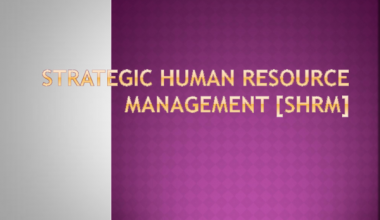A human resources management department is an essential component of employee well-being in any company, large or small. Payroll, benefits, hiring, firing, and complying with state and federal tax regulations are all examples of HR tasks.
Any misunderstanding about these issues can lead to serious legal issues for your company as well as major employee unhappiness. So are going in-depth on all you need to about human resources, the manager, and how outsourcing can be useful in the human resources management of your company.
What are Human Resources?
Human resources refer to both the people who work for a company or organization and the department in charge of managing all employee-related issues. Employees are one of the most valuable resources in any business or organization. The word “human resources” was first used in the 1960s, when the importance of labor relations became apparent and concepts such as motivation, organizational behavior, and selection assessments began to take shape in a variety of work environments.
Human Resources Management
Human resources management is a modern umbrella word for the management and development of personnel inside an organization. It is sometimes known as people or talent management (although both phrases are quite archaic), which includes controlling all aspects of an organization’s human capital.
As a result, human resources management is focused on several important areas, including:
- Recruiting and hiring
- Benefits and compensation
- Education and training
- Relations between employers and employees
- Organizational growth
Because there are so many areas of human resources management, it is common for experts in this industry to specialize in one or more of them. Among the many relevant job titles for HR specialists are:
- Specialist in training and development
- Human Resources Manager
- Benefits consultant
- Human Resources Generalist
- Human Resources Manager
- Compensation and Job Analysis Specialist
- Training and Development Manager
- Recruiter
- Human Resources Analyst
Changes in Human Resources Management
Human resources management entails both strategic and comprehensive approaches to managing people, as well as workplace culture and environment.
The human resources manager is responsible for ensuring that a company’s most valuable asset—its human capital—is nurtured and supported through the development and management of programs, policies, and procedures, as well as fostering a positive work environment through effective employee-employer relations.
Human resources management is based on the idea that employees who are subject to good human resources management are able to contribute to a company’s overall direction more effectively and productively, ensuring that company goals and objectives are met.
Today’s human resources management team is in charge of much more than just personnel and administrative functions. Instead, members of a human resources management team are primarily concerned with adding value to the strategic usage of people and ensuring that employee activities have a good and demonstrable impact on the business.
A Forbes article published in August 2014 examined the altering goals of today’s human resources management teams. More particular, the report discovered that HR teams who are focused on items that do not offer actual value to the corporation are frequently viewed as reactive, uncreative, and lacking in basic business understanding. HR professionals who want to be considered as true business partners, on the other hand, must see themselves as business people who specialize in HR, rather than HR people who advise a business.
To have a quantifiable and provable influence on business objectives, today’s human resources manager must understand the workings of the business and be able to easily speak the language of business executives.
Today’s Human Resources Management Team’s Agenda
According to the Forbes article, today’s HR management team must concentrate their attention on five crucial areas:
#1. Define and align organizational purpose:
To build a purpose-driven, sustainable, high-performing organization, personnel must be able to clearly define why the company exists. Employees must also comprehend how their activities relate to or fit with, the organization’s mission.
#2. Create, advertise, and sell an Employee Value Proposition (EVP) to attract top talent:
False marketing and misconceptions about a company are two of the most common reasons why the employer-employee relationship fails. As a result, organizations must design, advertise, and sell an EVP that is honest and accurate so that potential employees are not misled.
Employers must make every effort to discover what candidates and workers do well and place them in jobs that allow them to play to their strengths as much as possible.
#3. Create organizational alignment:
To build a successful and sustainable organization, achievements must be aligned with the organization’s objectives.
Accurately measure the same things: To obtain a decisive organizational result and to ensure that everyone understands exactly where the organization is at all times, all internal departments and personnel must be measuring the same things.
What is the Process of Human Resources Management?
Human resources management is carried out by dedicated HR experts who are in charge of the day-to-day execution of HR-related duties. Human resources is typically a whole department within any organization.
HR departments vary in size, structure, and the nature of their individual positions among corporations. It is not uncommon for smaller firms to have a few HR generalists who each execute a wide range of HR functions. Larger firms may have more specialized positions, with particular personnel dedicated to functions such as recruiting, immigration and visa processing, talent management, benefits, and remuneration, among others. Although various HR professions are distinct and specialized, job tasks may overlap.
Human Resources Management objectives
HRM objectives can be divided into four broad categories:
#1. Societal objectives:
Measures put in place to address the company’s and its employees’ ethical and social demands or issues. This includes legal considerations such as fair pay for equal effort and equal opportunity.
#2. Organizational objectives:
Actions are made to ensure the organization’s efficiency. This includes training, recruiting the appropriate amount of people for a given activity, and maintaining high staff retention rates.
#3. Functional objectives:
Guidelines are used to keep HR running smoothly throughout the organization. This includes ensuring that all HR resources are used to their full ability.
#4. Personal objectives:
Resources utilized to assist each employee’s personal ambitions. This includes providing opportunities for education or professional advancement, as well as ensuring employee happiness.
HRM’s aims within each organization’s unit are to:
- Assist the organization in achieving its goals by providing and retaining productive personnel.
- Make effective use of each employee’s skills and abilities.
- Ensure that personnel have or are receiving the necessary training.
- Create and sustain a great employee experience with high satisfaction and quality of life so that people can give their all to their jobs.
- Effectively explain to employees key company policies, processes, rules, and regulations.
- Maintaining ethical, legal, and socially responsible workplace policies and behaviors.
- Change to external elements that may affect personnel within the organization must be managed effectively.
Human Resources Manager Skills and Responsibilities
Human Resources Management can be divided into subsections, often by pre-employment and employment periods, with each having its own human resources manager. The following are some of the areas that a Human Resources Manager may be responsible for:
- Recruiting, onboarding, and retaining employees
- Workforce management and talent management
- Job assignment and advancement in one’s career
- Benefits and compensation
- Observance of labor laws
- Management of performance
- Development and training
- Succession planning
- Employee recognition and engagement
- Creating a Team
- Human Resources managers can benefit from the following skills:
- Relationships between employees
- Relationships with job candidates
- Recruiting and sourcing
- Management of interpersonal conflicts
- Onboarding of new employees
- Experience with HR software and information systems
- Management of performance
- Customer care
- Project management
Human Resources Management Career Opportunities and Requirements
A bachelor’s degree is often required to begin a career in human resources management. Some institutions offer human resources management degrees, which can lead to entry-level HR employment. Another approach to get a position in human resources is to get an undergraduate degree in a similar discipline, such as business administration. Furthermore, several years of experience in operations-heavy roles may be beneficial when transitioning into HR positions. There are also HR-specific master’s degree programs available to help create the requisite knowledge, skill sets, and qualifications for those who do not have a relevant undergraduate degree or transferable work experience.
Is an HRM degree required to work in Human Resources?
An HRM degree is very appropriate, relevant, and valuable, but it is not insurmountable if you do not have one. Other degrees that can connect nicely with the appealing HR job are also possible.
It is more crucial to have specific competencies and skills than a specific degree. However, comprehensive and targeted education naturally aids in the acquisition and application of appropriate competencies and skills.”
Why do you want to be a Human Resources Manager?
In the HR business, you must constantly balance what is best for the organization and what is best for the people who work there. It is a beautiful undertaking to create the bridge and establish a decent balance on it.
It’s also incredibly satisfying to be able to make a genuine difference for the business by responding properly to what’s going on in the company and the industry, being adaptable in your approach, and coming up with strong and original ideas. And for the employees, by assisting them in better understanding themselves, bringing their (hidden) abilities to light, and assisting them in realizing their dreams.
What characteristics are required of an Excellent Human Resources Manager?
Here are a few crucial characteristics that Human Resources Managers should possess.
#1. Thinking in terms of problem-solving
Many procedures are being replaced by computers, which increases the need for talents that computers are not good at (skills that cannot be translated into codes), such as analyzing, assessing, and inventing new ideas.
Fortunately, human intelligence is still required for this. Also, in Human Resources, the role of HR analytics is becoming increasingly crucial. When you utilize data and insights as the foundation for your advice and judgments as a human resources manager, you can persuade people more quickly.
#2. Collaboration with a variety of people
Employees are expected to be able to function in any context in a truly globalized society. This necessitates language abilities and adaptability, as well as the capacity to collaborate in a multicultural setting.
#3. Intelligence in social situations
In the future, more and more processes will be automated. Fortunately, computers still lag below human abilities in several areas, most notably social interaction and emotional comprehension.
That gets us to the third competency: social intelligence. HR professionals understand what various target groups want and what inspires them to act. It is critical to get to the heart of these target groups’ desires and requirements. Then you’ll be able to react promptly to their messages.
#4. Creativity
Creativity is required for an organization to stay ahead of the competition. As a human resources manager, you should be able to come up with fresh working techniques, innovations, and unique ideas that will set the firm apart from the competition.
#5. Perspective on new media
Understand how to use various communication channels. In the corporate world, user-generated content is becoming more prominent. Instead of static PowerPoint presentations, consider using movies, blogs, podcasts, and infographics.
The ideal employee for the next decade is “T” shaped: they have deep knowledge of at least one issue but can translate this knowledge into a broader variety of disciplines. As a human resources manager, you must understand not just recruitment and compensation and benefits, but also talent management, training developments, legislation and regulations, and data analysis.
Popular international study destinations for an HRM degree
We’ve compiled a list of the nations with the most Bachelor’s and Master’s degrees in Human Resource Management.
- United States – The average tuition is 20,000 EUR per year.
- United Kingdom – The average tuition is 10,000 EUR per year.
- Canada – The average tuition is 10,000 EUR per year.
- Australia – The average tuition is 20,000 EUR per year.
- Germany – the average tuition is 7,000 EUR per year.
Tuition Fees for Human Resources Degrees
If you don’t want to spend so much money on your HR courses, there are less expensive possibilities, particularly in Europe. Examine the tuition costs for:
- HR Bachelors in Ireland earn 3,000 EUR per year.
- An HR Master’s Degree in the Netherlands – 2,100 EUR per year
- HR Master’s Degree in Denmark – 0 EUR for EU/EEA students only
This is a high-level overview of tuition expenses. Human Resource Management programs can be found for less than 5,000 EUR each academic year in countries such as the United States, Canada, and others.
Note: Always check to see if your country’s students are subject to tuition costs. Denmark is a prime example, as it provides free HR degrees to EU/EEA students solely. You will have to pay if you are from another country.
Duration of Human Resource Management Courses
How long does it take to earn an HRM diploma? It is determined by the degree:
- Bachelor’s degree in human resources – 3-4 years
- Master’s degree in human resources – 1-2 years
Online HRM courses are similar in length, but you have the flexibility to study when and where you want.
Human Resources Degree Admission Requirements
Some of the most popular entry criteria for HRM study programs are as follows:
- Bachelor of Science
- IELTS 6.0 or TOEFL 75 is the minimum English language test score.
- Diploma from a high school
- Academic achievements
- Recommendation letter
- Interview
- Master of Arts
- IELTS 6.5 or TOEFL 80 is the minimum English language test score.
- a bachelor’s degree in a comparable field (some unis accept degrees in unrelated subjects)
- Minimum grade point average
- Two recommendation letters
- Statement of purpose
- Experience at work (1-2 years)
- CV
The Advantages of Online Human Resources Degrees
Most people select an online Bachelor’s or Master’s degree in Human Resource Management because they want to focus on other responsibilities, such as working part-time or full-time, turning a hobby into a profitable business, or spending time with their family and children.
Whatever your reason for wanting to study HR online, here are some of the primary advantages:
#1. Save both time and money.
Studying abroad is a rewarding experience, but it is not necessarily inexpensive. Some nations and locations are less expensive than others, but studying abroad is typically more expensive than studying online.
You’ll save money on transportation and lodging, and you’ll save time commuting. In a society when many individuals lament not having enough time for themselves, an online degree may allow you to have the best of both worlds.
#2. Control your timetable.
You can study whenever and wherever you choose. To study online, all you need is a solid internet connection and a computer or a mobile device, such as a laptop, tablet, or even a smartphone if the smaller screen size isn’t an issue for you.
#3. Improve your digital abilities.
An online Human Resources degree allows you to investigate the most recent venues for communication and file sharing. You may be familiar with the most common internet tools, but there are new apps and websites that can help you with your work. You may even recommend them to your coworkers if you believe they can boost communication and teamwork.
#4. Online degrees boost your resume.
Completing an online degree in HRM will be difficult, especially if you have other obligations such as being a full-time employee. However, if you can pull it off, it will be of big value to your Curriculum Vitae. It will demonstrate to potential employers that you are an ambitious person who can set objectives, identify the steps to get there, and do what is required to achieve.
Related; MASTERS IN FINANCE PROGRAM: Syllabus, Jobs, Degrees & Top Picks
What can I accomplish with a degree in Human Resource Management?
These are some of the most common careers available to those with an HRM degree. We’ve also included PayScale’s typical salary in the United States, as well as some of the primary activities and responsibilities. This will give you a better understanding of the abilities and expertise required for each role.
40,000 USD per year as a Human Resources Assistant
- Respond to employee emails, phone calls, and questions.
- Insert, update, and double-check data accuracy
- Organize meetings and appointments, as well as monitor HR schedules
Mediator – 57,000 USD per year
- Evaluate issues, talk to people, and try to figure out what is causing these problems.
- Facilitate dialogue between disputing parties.
- Collaborate with each party to reach an agreement that is acceptable and useful to both parties.
50,000 USD a year for a Human Resources Specialist
- Plan, organize, and carry out interviews with prospective personnel.
- Manage all of the documentation that new employees must read and sign.
- Answer queries about benefits, personal difficulties, and so on.
Manager of Training and Development – 75,000 USD per year
- Make, test, and enhance training manuals and other instructional materials.
- Determine training budgets, identify instructors, and prepare cost-benefit analyses.
- Oversee various activities relevant to the professional and personal growth of employees.
Human Resources Manager – USD 66,500 per year
- Create and facilitate the implementation of administrative human resource planning.
- Supervise the primary operations and tasks of the HR staff.
- Conduct annual salary, budget, work environment, and job satisfaction surveys.
Related: Technical Project Manager: Salary, Job Description, Skills (Updated)
Human Resources Management Software
Almost all aspects of HRM have sophisticated software that automates different degrees of many HR procedures, as well as other capabilities like analytics. For example, the number of software platforms and systems that enable both employers and job seekers to electronically link companies and people with each other and then aid manage the interviewing, hiring, and employment processes has increased dramatically.
While some HRM software systems began on-premises, practically every sector of HR technology, particularly HCM systems, is migrating to cloud-based software as a service (SaaS) platforms.
Read Also: Business Software: 27+ Best Software & Programs For Your Small Businesses
Human Resources Outsourcing
Human Resources Outsourcing is the process by which a firm hires a third party to handle its human resource responsibilities. A corporation may outsource some or all of its Human resources-related activities to a single or a group of service providers in offshore locations such as India, China, the Philippines, and so on. In general, HR services that are not important or confidential are outsourced.
Such activities include recruitment and selection, payroll and compensation management, staff training, employee benefits and service, and job evaluation. Unilever’s decision to outsource its HR activities – mostly transactional in nature such as payroll administration, applicant tracking, training and development, record keeping, performance appraisal follow-up, and so on – to Accenture in 2006, for example, appears to be a step in the right direction.
These are primarily human and labor-intensive tasks that are repetitive in nature. Such repetitious work can easily be delegated to a third-party specialist, who will be able to offer exceptional outcomes, resulting in significant cost and effort savings. The professional is also able to assist at an incredible pace thanks to the standardization of methods.
Related: Outsourcing: Definition, Benefits & Examples of Outsourcing Companies
The Importance of Human Resources Outsourcing
Many considerations will influence any organization’s decision to outsource its human resources activities.
Some of the resources for Human Resources Outsourcing are as follows:
- Allowing firms to concentrate on core operations
- Providing cost savings – direct or indirect
- Assisting in the development of a reliable, cost-effective operating platform
- Shifting emphasis from internal processes to the attainment of commercial objectives
- Making investments in HR transformation and IT systems a reality
- Ensuring legal, regulatory, and best practice requirements are met, and
- Risk and liability transfer for person issues
Types of Human Resources Outsourcing
Human resources outsourcing is widely classified into three types:
- Application Services Provider (ASP)
- Business Processes Outsourcing (BPO)
- Outsourcing of All Human Resources
#1. Application Service Provider:
Many companies specialize in providing hardware and software applications to support large organizations, including application vendors such as PeopleSoft, Oracle, and others that have developed application packages (PeopleSoft HRMS, Oracle HRMS) to support human resource activities in an organization.
They install, customize, and support the use of these programs. The primary downside of ASP is the cost of application software. Second, the application software’s successful execution is in doubt.
#2. Business Process Outsourcing
The primary distinction between BPO and ASP is that with BPO, the client has direct interaction with personnel via call centers or support centers. MNCs typically choose BPO since they operate in multiple countries and employ a significant number of people. While some businesses prefer to keep control over their human resources, others delegate that authority to service providers. BusinessYield is an example of such an organization offering HR and other digital services.
#3. Total Human Resources Outsourcing
The service provider manages the complete human resources function in this sort of outsourcing. The organization does not have a separate HR department. Only senior HR experts who are also HR strategists work for the client organization. The service provider handles a variety of non-strategic duties including employee engagement.
Human Resources Outsourcing of Services from a Third Party
#1. Staffing Services:
Recruitment and selection are human resource services that bring in knowledge carriers from outside an organization. Human resources or knowledge carriers are primarily supplied to the external market by three sources: households, academic institutions, and industries. All of those looking for work can find it in a variety of markets. Prospective employees look for jobs through a variety of channels and media.
As a result, there are numerous markets in which an employer might locate employees. These potential labor markets differ not only in terms of the number and quality of available personnel but also in terms of a new hire’s readiness to retain employment connections with the company for many years.
#2. Development Services :
Companies purchase explicit market acquired knowledge when outsourcing external developmental resources. Because many other organizations are experimenting with novel ideas in management processes, a company can improve the capability of its employees by exposing them to the practices of other companies. Furthermore, there is scalability in the collecting and compilation of such information.
Furthermore, some organizations, such as academic institutions and professional manpower training institutes, specialize in such information collecting, structure, and presentation to prospective learners.
#3. Performance Management:
Organizational performance is measured at three levels: the overall organizational level, the group or departmental level, and the individual employee level. Performance information or statistics at the overall organization and at the group or department level are largely explicit knowledge-intensive, and their measurements are less contentious, though there may be a few areas where tacit and customized knowledge is used.
As a result, a corporation can outsource the evaluation of those aspects of its organizational and departmental performance that require explicit information while retaining the subjective and qualitative aspects in-house.
The scope of outsourcing in the domain of individual employee assessment is extremely limited because many of these assessments are subjective and rely heavily on tacit relationship information.
#4. Compensation and Benefits Administration:
Compensation is an important component of human resource services since it ensures that the organization and its various positions are supplied with adequately skilled labor. Unless the remuneration for various roles is appropriate to remunerate the qualification and experience required for the work, it may fail to recruit suitable people for those positions, and it will be more difficult to retain such personnel for an extended period of time.
Because the primary purpose of well-designed compensation is to recruit and retain personnel in the company, the compensation system and technique must be consistent with the practices of the organization’s rivals. This suggests that an external compensation system designer can outperform an internal expert. Because these external suppliers provide identical services in many other businesses, their design and methods closely match market practices.
#5. Management of Reward and Incentive Programs:
Employees are encouraged to go above and beyond the call of duty by using rewards and incentives. A good compensation system not only draws the proper kind of individuals to the business but also encourages them to perform in such a way that organizational competencies are preserved. A well-linked incentive with the achievement of an objective end is a potent motivator for employees to work hard and exhibit the desired behavior.
However, for the majority of managerial jobs, such objective outcomes are generally available at the unit and group levels. Only a few positions allow an employee’s actual contribution to corporate goals to be directly tied to the incumbent’s ability, competency, and drive. This means that a company can outsource reward management at the group and unit levels but not at the individual level.
#6. Specialized consulting services:
Consultancy is a rapidly expanding service industry in several nations. This company’s rapid growth can be attributed to a variety of factors. To begin, many large multi-functional, multi-product firms periodically discover a significant mismatch between the labor required and the manpower available in different areas, both in terms of quantity and quality. This occurs because organizational processes have inertia and are frequently held hostage by their previous triumphs.
Few businesses can modify internal policies, and even fewer can change departmental staffing allocations at the same rate as the external environment. The presence of several interest groups, each with its own set of powers and pulls, shapes any change in an organization’s policy.
Related: 5 Top management consulting services in high demand
#7. Employment Relationship Management for Low-Level Jobs:
Aside from outsourcing specific elements of human resource management services, another sort of Human Resources outsourcing is emerging as a new development in which Company A hires another Company B to manage its whole department or division. Company B will bring its own personnel to the premises of Company A and monitor them while they work there. Company A’s contract is only with the owner of Company B.
Benefits of Human Resources Outsourcing
Outsourcing human resources provide the following advantages:
- Risk reduction and transfer (employment legislation is growing increasingly complex, with penalties for violation potentially crippling businesses).
- Cost-effective and adaptable solutions (scaleable up or down quickly)
- Gaining access to a diverse set of talents and experiences
- Allow in-house HR to focus on strategic issues.
- Remove non-operational stumbling blocks from the line.
- Access to best practices in the industry
- Remove the burden of recruiting, managing, and motivating a diverse in-house HR team.
- Provide employees with a more stable career path
- Increase commitment and energy in areas outside than the core.
- Convert fixed costs to variable costs
- Reduce expenditures to achieve improved provider performance and a lower cost structure.
- Use the provider’s network to gain market access and commercial opportunities.
- Commercialize your existing skills
- Increase sales and production capacity during periods when revenue growth cannot be financed.
- Accelerate growth by leveraging the provider’s existing capabilities, processes, and systems.
How can Human Resources support remote work and flexible work arrangements for employees?
Human Resources can support remote work and flexible work arrangements by working with employees and managers to determine the best arrangements for their needs. This may involve negotiating schedules, determining technology and equipment needs, and ensuring that employees have the support and resources they need to be productive and engaged while working remotely.
What is the role of Human Resources in developing and implementing company culture?
The role of Human Resources in developing and implementing company culture is to create and maintain a positive and productive work environment. This involves defining the values, behaviors, and expectations of the organization and communicating these to employees. HR can also support the development of programs and initiatives to reinforce the company culture and create a supportive and inclusive workplace.
How can Human Resources help with managing and resolving workplace harassment and discrimination?
Human Resources can help with managing and resolving workplace harassment and discrimination by establishing and enforcing policies and procedures that prohibit such behavior. HR can also provide training and education to employees on what constitutes harassment and discrimination and how to report it. When incidents are reported, HR can work with management to investigate and take appropriate action, including disciplinary measures and appropriate remedies for affected employees.
What is the role of Human Resources in organizational change and restructuring?
The role of Human Resources in organizational change and restructuring is to support the implementation of changes in the workplace and minimize their impact on employees. HR can work with management to plan and communicate changes, provide support and resources to employees, and help manage any transition issues that arise. They can also provide guidance on compliance with laws and regulations related to workplace changes.
How can Human Resources assist with employee wellness and mental health?
Human Resources can assist with employee wellness and mental health by developing and implementing programs and initiatives to promote healthy behaviors and attitudes in the workplace. This may include offering wellness resources, stress management programs, and mental health benefits. HR can also provide training and education to employees and managers on mental health and wellness and offer support and resources to employees who are struggling with mental health issues.
What is the role of Human Resources in compliance with labor laws and regulations?
When it comes to compliance with labor laws and regulations, the role of human resources is to ensure that the company is in compliance with all relevant laws and regulations. This includes laws related to minimum wage, overtime pay, health and safety, and equal employment opportunities. HR can provide training and education to employees and managers on these laws, conduct regular audits to ensure compliance, and work with legal counsel to address any compliance issues that arise.
Human Resources FAQs
Why is HR so important?
HR is critical in building, strengthening, and changing an organization’s culture. Pay, performance management, training and development, recruitment and onboarding, and reinforcing the company’s values are all important aspects of the business culture that HR oversees.
Is human resources hard to study?
HR degrees can be challenging because they combine business and human relations training. However, students who prepare properly and follow good study habits should find this curriculum no more difficult than other business disciplines.
What is HR Day?
On May 20, the world observes International Human Resources (HR) Day. It is a global acknowledgment of the hardworking individuals who play critical roles in all industries.
- Outsourcing: Definition, Benefits & Examples of Outsourcing Companies
- The Importance of Resources for the Success of Any Business
- TASK MANAGEMENT SOFTWARE: 25 Best Task Management Software Solution
- COMPENSATION PACKAGE: Overview, Examples, and Best 2021 Practice
- 5 Top management consulting services in high demand






